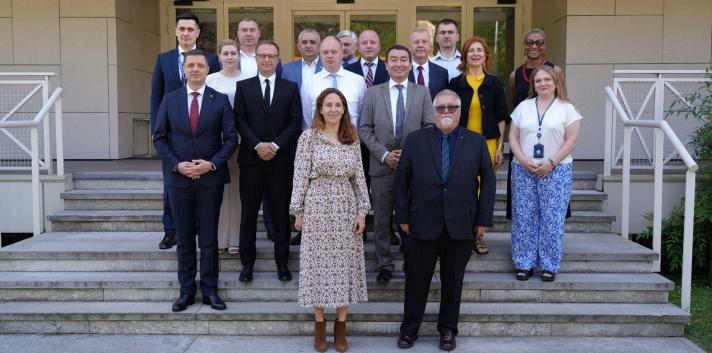
Moldova’s proximity to regions of instability, its role as a transit country, and its evolving security landscape make it vulnerable to chemical, biological, radiological and nuclear (CBRN) threats. Addressing these risks requires a coordinated national response that bridges the gap between field investigations and judicial prosecution. In response, the European Union (EU) is supporting Moldova in building specialised expertise through an innovative, integrated training programme.
Building national expertise to tackle CBRN threats
From 18 to 20 June 2025, ten Moldovan instructors completed a Train-the-Trainer (TTT) course at the headquarters of the United Nations Interregional Crime and Justice Research Institute (UNICRI) in Turin, Italy. The course marked a key milestone in the EU-funded project “From CBRN Crime Scene to Courtroom,” which aims to strengthen Moldova’s capacities to investigate, prosecute, and adjudicate CBRN crimes.
The TTT course combined two days of theoretical instruction with a hands-on day of peer-led training. Topics covered included adult learning principles, training methodologies, national implementation, and the use of presentation tools and experiential learning strategies. Upon completion, participants were certified as national trainers, equipped not only to deliver the material but to adapt it for future training demands.
A comprehensive national training programme
Launched in 2024 under the EU CBRN Risk Mitigation Centres of Excellence, the “From CBRN Crime Scene to Courtroom” project is the first to provide an end-to-end training framework connecting frontline response with courtroom adjudication. Moldova was selected as the pilot country, recognising its strong institutional commitment and the relevance of the threat landscape.
The programme consists of five progressive modules:
- Tabletop Exercise: Mapping inter-agency coordination and operational gaps.
- CBRN Criminalisation Workshop: Understanding international legal frameworks and their domestic application.
- Building a Case for Prosecution: Turning forensic data into admissible legal evidence.
- Mock Trial / Moot Court: Simulated legal proceedings under national law.
- Train-the-Trainer (TTT): Enabling national ownership and long-term sustainability.
Sustainability through national ownership
All five modules have now been successfully delivered in Moldova in a national format. The TTT course marked the formal handover of the training package to Moldovan institutions, including the National Institute of Justice, the Police Academy, and national security training centres. Over 50 training modules are expected to be institutionalised, creating a sustainable learning ecosystem within Moldova’s justice and security sectors.
Looking ahead
Between 2025 and 2027, the project will roll out nine tailored training sessions for approximately 300 law enforcement officers, forensic experts, prosecutors, and judges across Moldova. These efforts will help reinforce the country’s legal and operational capabilities to prevent and respond to CBRN threats.
“From CBRN Crime Scene to Courtroom” goes beyond training. It is a strategic, EU-supported investment in Moldova’s capacity to respond to complex security threats with professionalism, legal precision, and institutional resilience.
To learn more about the EU CBRN CoE support to CBRN risk mitigation in South East and Eastern Europe, visit the Regional Secretariat page
Details
- Publication date
- 27 June 2025
- Authors
- Service for Foreign Policy Instruments | Joint Research Centre
- CBRN areas
- Investigation and prosecution
- Legal framework
- Safety and security
- CBRN categories
- Chemical
- Biological
- Radiological
- Nuclear
- CoE Region
- SEEE - South East and Eastern Europe

